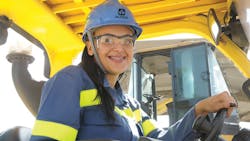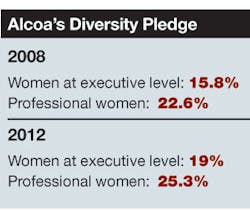Leadership & Strategy: Accessing the Industry's 'Untapped Natural Resource'
Alcoa doesn't want to be known for producing primary and fabricated aluminum. At least not entirely.
The New York-based company also is on a quest to become known as the place that harnesses the best talent, according to Chief Diversity Officer Gena Lovett. "I want us to be known as the home of the most talent and the most inclusive," she says.
See Also: Lean Manufacturing Leadership Best Practices
Alcoa is already well on its way, led by the beliefs of CEO Klaus Kleinfeld. After becoming CEO in 2008, Kleinfeld made diversity a priority within the company, encouraging the implementation of a formal program.
That year, Alcoa launched "Building Opportunities for Women in a 'Hard Hat' Company" to change the culture of the manufacturing company and equalize the gender representation within its walls.
"Prior to embarking on this initiative, as a company we thought we were doing pretty well," Lovett says. "Then, Klaus became CEO and he thought differently."
The company used Catalyst, a nonprofit organization supporting women in business, to develop benchmarks.
"We didn't know exactly what 'good' looked like; we knew we weren't it," Lovett says.
Alcoa's efforts paid off this year when it received the Catalyst Award, presented annually to firms that make strides in recruiting, developing and advancing women in the workplace.
"We have talent management embedded in all of our processes," says Lovett, who urges a holistic approach to inclusion.
By the Numbers: Cultural Change
By 2012, Alcoa had increased the number of women at the executive level to 19% and the number of professional women within the company to 25.3%. That was all during a period that Alcoa's total employment numbers were contracting.
"We brought about a cultural change because we demonstrated that we could make it happen," Lovett says. But, she notes, the process wasn't easy and is certainly far from over.
"This is very much for us a journey," says Lovett. "Winning the Catalyst Award was affirmation for us that our journey is the right one, but by no means are we done."
Lovett is developing a three-year plan with even more aggressive targets. While she would like to see women represent 50% of the population within that time frame, she acknowledges,"I don't think we will be at 50% of the population, but we will be closer."
Alcoa monitors diversity like any other metric, holding leaders accountable at every level for hiring and promotion decisions, because just hiring women isn't enough to effect real change -- there needs to be a system of promotion in place to ensure that women see a future in the company and want to remain on board long term.
The company also is aggressively seeking out new talent, developing partnerships with high schools and the Girl Scouts.
"We're not waiting for them to come to us," says Lovett, who refers to women as manufacturing's "untapped natural resource."
Click here to for a step-by-step guide to Alcoa’s diversity initiative.
About the Author
Ginger Christ
Ginger Christ, Associate Editor
Ginger Christ is a former associate editor for EHS Today, a Penton publication.
She has covered business news for the past seven years, working at daily and weekly newspapers and magazines in Ohio, including the Dayton Business Journal and Crain's Cleveland Business.
Most recently, she covered transportation and leadership for IndustryWeek, a sister publication to EHS Today.
She holds a bachelor of arts in English and in Film Studies from the University of Pittsburgh.

